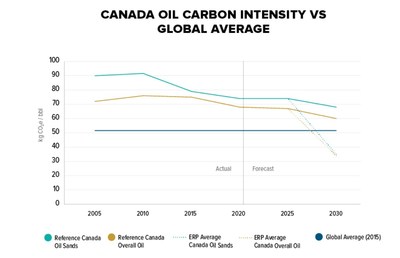Subjects: ENI, ENP, CFG
Government of Canada to develop guidance for best-in-class new oil and gas projects and net-zero emissions requirements by 2050
OTTAWA, ON, April 6, 2022 /CNW/ - As a major economic contributor to the country and Canada's largest source of greenhouse gas emissions, the oil and gas sector has a critical role to play in meeting Canada's climate objectives. To remain competitive in a global market that is moving away from fossil fuels combustion to address climate change and enhance energy security, new Canadian oil production subject to federal impact assessment will have to meet even higher standards. New projects would have to deliver emissions performance?the amount of greenhouse gas pollution it takes to produce a barrel of oil or cubic metre of natural gas?that is best in class, and all future oil and gas projects would have to be net zero by 2050.
Today, the Minister of Environment and Climate Change, the Honourable Steven Guilbeault, announced plans to develop guidance that will require proponents of new oil and gas production projects subject to a federal impact assessment to demonstrate that they will have "best-in-class" low-emissions performance.
With some global demand for oil and gas expected even once the global economy reaches net-zero emissions, now is the right time to transform Canada into the cleanest global oil and gas producer. Moving to provide low-carbon and non-emitting energy products and services will help ensure economic competitiveness and prosperity, and create good, sustainable jobs for Canadians.
The new guidance will explain how proponents of new oil and gas projects subject to a federal impact assessment should use the analysis required by the Government of Canada's strategic assessment of climate change (SACC) to demonstrate that the project will be "best in class," such as by:
- demonstrating that the project will integrate advanced technologies and best environmental practices (BEPs), including emerging technologies, to minimize emissions;
- comparing the project's emissions with high-performing projects in the world; and
- developing a plan to achieve net-zero emissions by 2050 if the project will continue to operate after that date.
The new guidance will also include information about how a proposed project is consistent with the overall economic transition to a low carbon-economy, including considerations such as how the project will remain competitive across global low-carbon transition and net-zero scenarios, and how it avoids supporting activities and assets that are at risk of becoming stranded from declining demand.
The development of the guidance will be informed by consultations with industry, provinces, territories, Indigenous Peoples, and other stakeholders.
As the world acts on climate change and the global supply of fossil fuels becomes cleaner, Canada's oil sector will need to continue to drive down emissions and costs to remain competitive. The following graph illustrates how the federal measures outlined in the 2030 Emissions Reduction Plan will ensure that Canadian oil and gas production becomes less emissions intensive (i.e. fewer emissions per barrel) over the next decade. While the actual trajectory to 2030 will unlikely be a straight line as portrayed, and the global average is also unlikely to remain static, reducing the carbon intensity of Canadian production below the global average is both possible and likely to be increasingly important in order for Canadian industry to compete in an increasingly constrained global market.
"In a global market moving away from fossil fuels combustion, this new guidance will help steer oil and gas projects towards "best-in-class" low-emissions performance and maintain our competitive advantage. And by 2050, any projects operating in Canada will have to be net-zero emissions. This policy guidance helps implement our ambition for the sector and builds off our recently announced 2030 Emissions Reduction Plan, which included $9.1 billion in new investments and a suite of new measures to help mobilize Canada towards a truly sustainable economy and a leading competitor in the global transition to cleaner industries and technologies."
? The Honourable Steven Guilbeault, Minister of Environment and Climate Change
"Around the world, smart money is increasingly flowing away from assets that are not compatible with a transition to a net-zero world, and towards opportunities that are. Fuels that are produced in an ultra-low carbon fashion will have significant value internationally going forward, and Canada is positioned to provide these fuels as part of our broader suite of domestic and international climate measures."
? The Honourable Jonathan Wilkinson, Minister of Natural Resources
- The oil and gas sector is Canada's largest source of greenhouse gas emissions. In 2019, it accounted for 26 percent of the country's emissions.
- On March 29, the Government of Canada published the 2030 Emissions Reduction Plan: Canada's Next Steps for Clean Air and a Strong Economy. The plan includes a projected contribution from the oil and gas sector of emissions reductions to 31 percent below 2005 levels in 2030 (or to 42 percent below 2019 levels). This commitment is a guidepost for action, and will guide the Government of Canada's work with industry, stakeholders, provinces and territories, Indigenous Peoples, and others to develop the cap on oil and gas sector emissions.
- Canada is positioning our industries to be green and competitive. The Government of Canada will introduce a tax credit to incentivize the development and adoption of carbon capture, utilization and storage (CCUS) technologies for a range of sectors.
- The International Energy Agency has demonstrated that in a net-zero world by 2050, oil consumption will go from roughly ninety million barrels per day to around twenty-four million.
- Last fall, the Government of Canada committed to cap oil and gas emissions at a pace and scale needed to achieve net zero by 2050. Projects approved under the Impact Assessment Act will need to fit in and comply with the cap once it is in place.
Environment and Climate Change Canada's Twitter page
Environment and Climate Change Canada's Facebook page
SOURCE Environment and Climate Change Canada
These press releases may also interest you
|
News published on and distributed by:




